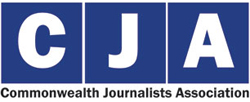The Commonwealth Broadcasting Association (CBA) the Commonwealth Journalists Association (CJA) and the CPU Media Trust are the three main organisations working on media and broadcasting issues in the Commonwealth.
Commonwealth Broadcasting Association (CBA)
17 Fleet Street, London EC4Y 1AA, UK
Tel: +44 20 7583 5550 | Fax: +44 20 7583 5549 | Email: cba@cba.org.uk | www.cba.org.uk
The CBA has been supporting and working with public service broadcasters (PSBs) across the Commonwealth since 1945. It has more than 100 members in over 50 countries and currently focuses on supporting PSBs through digital transition.
Foundation: 1945
Secretariat: Secretary-General: Sally-Ann Wilson (sally-ann@cba.org.uk); Finance Manager: Mervyn Warner; Project Manager: Jasmine Dhariwal (jas@cba.org.uk); Project Manager: Adam Weatherhead (adam@cba.org.uk); Researcher: Mandy Turner (mandy@cba.org.uk)
Activities: The CBA holds a biennial pan-Commonwealth broadcasting conference. The most recent conference, on the theme of ‘Media Leadership in Crisis, Disaster and Emergency’, took place in Brisbane, Australia, in April 2012. The CBA offers members high-quality training courses in all areas of broadcasting. It produces a number of specialist publications on subjects such as broadcasting regulation and editorial guidelines. Additionally, it runs a News Exchange, facilitating the exchange of new stories between participating members, and WorldView, which provides funding and assistance for producers to improve UK media coverage – of the wider world. Your WorldView is an online platform for new and emerging film-makers to showcase their work to broadcasters and debate development issues.
Publications: CBA Annual Directory and Handbook. A new professional media journal was launched in 2012.
The Commonwealth Journalists Association (CJA)
c/o Lower Suite, 1099 Ambercroft Lane, Oakville, Ontario L6M 1Z6, Canada
Tel: +1 416 575 5377 | Fax: +1 416 923 7206
Email: pat.perkel@commonwealthjournalists.org, pat.perkel@gmail.com
www.commonwealthjournalists.com
The CJA works to improve journalistic standards and skills in Commonwealth countries, promotes the role of the media in good governance and development, and fosters interest in Commonwealth affairs. The CJA’s executive director is based in a Toronto (Canada) suburban community and works with an executive committee made up of representatives from all regions of the Commonwealth.
Foundation: 1978
Officers: President: Hassan Shahriar (Bangladesh); Vice-Presidents: Martin Mulligan (Europe), Chris Cobb (North America and Caribbean); Executive Committee members: Champika Liyanaarachchi (Sri Lanka), Mahendra Ved (India), Lance Polu (Samoa), Fauzia Shaheen (Pakistan), Newton Sibanda (Zambia), Caroline Jackson (Malaysia), Syed Belal Ahmed (UK), Alice Drito (Uganda), Bruce Kaplan (Australia), Derek Ingram (UK), Rita Payne (UK), Murray Burt (Canada), Farid Hossain (Bangladesh); Executive Director: Bryan Cantley (in Toronto)
Activities: Training courses and workshops are organised for journalists in developing Commonwealth countries. The CJA also works closely with journalists in developed countries to improve journalists’ skills, standards and ethics, and to promote the Commonwealth. The CJA intervenes in defence of journalists’ personal and professional rights where these are threatened, sometimes in concert with other Commonwealth organisations.
CPU Media Trust
The Trust is a ‘virtual’ organisation with no physical office. Initial contact is via: Email: office@cpu.org.uk | www.cpu.org.uk
Foundation: June 2009
Officers: Lord Black of Brentwood, Executive Director of the Telegraph Media Group, chairs the Board of Trustees. The other seven trustees are all key media figures with wide-reaching and longstanding involvement in the Commonwealth media. A consultant, Lindsay Ross, who was formerly the Executive Director of the Commonwealth Press Union, assists them. The Board meets quarterly.
Aims: The CPU Media Trust is pledged to uphold and defend the freedom, interests and welfare of the media in Commonwealth countries and is committed to a professional, ethical and effective media across the Commonwealth. It actively promotes the highest professional and ethical standards, and monitors and opposes any measures designed to affect the freedom of the media and of journalists in any member state of the Commonwealth. Its primary concerns are supporting media freedom and media rights, the training of journalists, and a thorough understanding of media law and the establishment and support of self-regulatory bodies throughout the Commonwealth. The year 2013 will see the launch of a new online training portal for journalists throughout the Commonwealth.
History: The CPU Media Trust was established in June 2009, following the closure of the Commonwealth Press Union in December 2008. The origins of the CPU go back to the early part of the 20th century when Sir Harry Brittain – an eminent journalist and politician – working with the great press barons of the time, organised the first Imperial Press Conference, a week-long countrywide event that began in London on 9 June 1909. At the end of the Conference, it was unanimously agreed to create the Empire Press Union, which would act as a networking organisation for the press of the British Empire and Dominions. Over the next 41 years, the organisation organised regular conferences across the empire with delegates drawn from the proprietors and senior editors of the various newspaper houses. These conferences enabled the industry to plan and enact key media strategies.
In 1950, in tune with the changing times and the formation of the new Commonwealth, the organisation’s name was changed to the Commonwealth Press Union and a new charter was devised. The mission of this new organisation was to safeguard the interests of the Commonwealth press, train journalists and provide a networking opportunity every three or four years in the form of an international conference. The membership of this new organisation was institutional rather than individual, with, at its height, more than 1,500 newspaper houses or individual newspapers across the new Commonwealth.
Over the years the CPU trained thousands of journalists in almost every country or region of the Commonwealth, and established a solid reputation for defending the freedom of the Commonwealth press and organising successful and high-profile conferences every two or four years. As funding became increasingly difficult to secure for training and related projects, it became apparent that the organisation could no longer continue in its past form.
The new CPU Media Trust provides a ‘virtual’ successor to the old organisation, taking forward its aims and aspirations to support the Commonwealth media in the twenty-first century.


